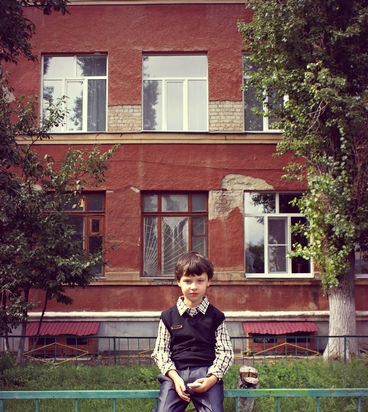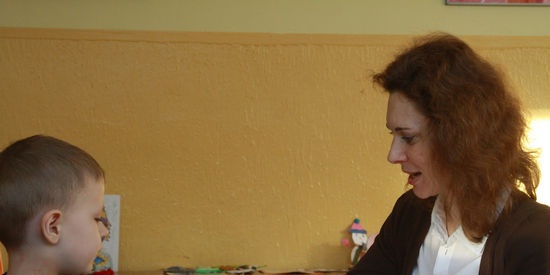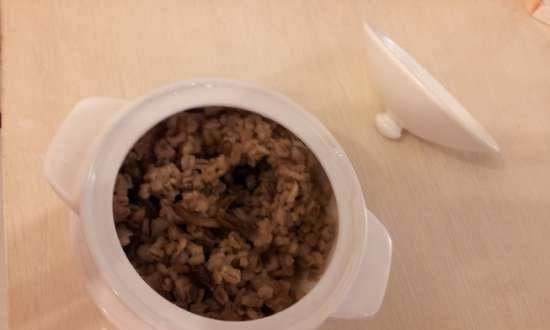A teacher has come to your house |
|
A cry of terror echoed through the class: "What for!?" And Kostya said bluntly: "And when I see you, I will immediately leave home!" Pale Lilya timidly clarified: "Will you also come to good students?" In my opinion, she was even capable of sacrifice - to study well - so long as the teacher did not come home. I stood a little confused: why such a reaction? After all, they do not yet know why I will come to their house, what I will tell their parents. They, in essence, don't even know me properly, but now they are expecting a catch - and only a catch. Then, a moment later, I understand that it is stupid to be angry and offended (even more so!). After all, now they are simply sincerely expressing what adults are hiding. And they hide a deep conviction: if the teacher came to the house - expect trouble and trouble. Now, immediately, you will find out how bad your son is, how rude he is, how lazy, how he disrupts physical education or singing lessons, how he does not do his homework, etc., etc. With another message, the teacher rarely enters his student's house. And I give myself my word: for the first time to come to the house of my boys and girls only with a good one. Only with a good one. And I tell them about it. And half-jokingly, half-seriously I try to educate them as polite hosts: I teach them to be the first to greet the teacher when he comes, to offer to undress, to take a heavy bag with notebooks ... And even to offer tea. And treat with apples if they are on the table. In a word, I convince them that I will be a guest, not a gendarme. Six months have passed. My good intentions to visit my pets as often as possible are crumbling. There are days when it seems that there will be no end to student mistakes and notebooks ... There will be no end to meetings, meetings, extra classes, shifts and a lot of other things, without which it is impossible to imagine the work of a teacher. But, on the other hand, it is impossible, impossible to imagine the upbringing of children without a thorough, deep knowledge of the conditions of their life outside of school, in the family. After all, she, this life, very often turns out to be completely, completely different than beyond the school threshold. - What will you do if you are treated to tea in every house? - I'll drink! - One tea? - Why? Maybe they'll give me a piece of bread ... - Come to us, we have cookies. This is said without a trace of playfulness. What lovely, simple-minded faces my children have ... Cheeks flushed, eyes shine, their voices ring in the frosty evening air. What Good Grown Children! This is about my five-graders said the poet Leonid Martynov But clear does not mean serene. Clear does not mean not knowing tears, suffering. ... Sonya, on the other hand, is most often sad. Only sometimes a smile will flash on her face. And it will go out immediately, as if frightened. ... And Pavlik has a completely carefree smile, and he is always cheerful. Always cheerful. This is not very comforting either. ... And Tamara today for the first time spoke to the class with a small message, was very worried, but spoke well. ... Finally, the ice broke, and Oleg fulfilled his first public assignment ... Every day in our pioneer republic is full of events - big and small. With all this, the teacher goes to the house where his pets live. Today, first of all, I will go to Sonya. She has gotten a little better with her studies, and I want to please her mother. I remember a sweet young woman who cried in the teacher's room and kept repeating: “She doesn't go anywhere, she sits at home all day. Why two? " And I don't know why there are two. The girl is closed, in the class she keeps herself apart. This is unusual for her age. I go into the hall. Mother opens. Greetings. From the room I hear a rough male voice: - Who's there? Who is talking? Documents! Soon the owner of the house appears. In a vest. Sleepy eyes. Moving right up to my face, the bass is demanding. - Who are you? Documents! - I'm your daughter's teacher. - Ah! Does not matter. Documents! I understand the uselessness of logic in a conversation with a drunk, but in order to somehow bring him to his senses, I offer him my daughter's notebook. He growls: - How does she study? Quitter! I know I'm a quitter! We leave three of us: me, Sonya and mother. I listen to my mother's bitter, like wormwood, confession. It turns out that today's picture is an ordinary phenomenon. And now it is clear to me why the girl rarely smiles. And my mother, it seems, still believes that there is no connection between her daughter's twos and her father's behavior. I feel my complete powerlessness. How to help and how? The girl is well fed and dressed. The room even seems to have polished furniture. “She has a mother and a father. But she is deprived of the main thing - a bright idea of life. She is sure that this is probably the case with everyone: her father does not sleep until morning and does not allow her; she is sure that this is normal; father never once held her notebook and diary in his hands. I am sure that it cannot be otherwise, that this is the norm. And if not the norm, then why is it in our life? I go and think: will I be able to convince her otherwise? But I am firmly convinced of one thing — I will not allow a pedagogical mistake, a shout, an unjust reproach in relation to her: I saw her sitting on the sofa today, a small, crumpled bird. She sat and shuddered, listening as her father demanded documents from her teacher. I myself must cultivate the power of protest, the desire to live and learn differently. Confidence that this is possible. She must understand this wise human truth: from a person • in the end it turns out that he wants and will be able to educate in himself. For, it seems, even her mother is a bad support and helper for her. ... When Genka reads or tells something in the classroom, the whole class loves to listen to him: he is so good at everything. He directly lives by what he talks about. Especially expressively he conveys the characters of animals. They are like people: mischievous, cunning, self-confident. He studies well, but unevenly. For a whole week, only fives adorn his diary, and he shines. Then suddenly the troikas will run up, and Genka will be hunched over, saddened, his eyes will be filled with tears, but he is completely adult, like a man, he knows how to stop them: he shakes his head sharply - two large peas will roll down - and that's it. Today he again (for the umpteenth time!) Showed up for lessons without a pen, and the whole day was wasted. Today he was guilty of singing - he laughed the whole lesson. And when I asked what was the reason for the laughter, I answered innocently: - The teacher spoke funny words. And yet the main reason for my visit to their house is not this. I need to find out where this unevenness in studies, absent-mindedness, frequent delays come from. I go up to the apartment on the 5th floor. He just had time to undress when he came home from school. (He left it an hour ago! But in childhood the roads always seem longer and ... more interesting than in old age!). He opened the door in his panties, but the spirit of chivalry overcame the embarrassment, he offered to undress, he hung up his coat, put down his bag and ran to put on his trousers. I go into the room. The TV is already on, the parents are not at home yet. Well, efficiency! On the table is a pile of paper, an elastic band, a torn mitten, a slingshot, an old atlas, an ABC book (?), Candy wrappers, and of course, the ill-fated pen is not visible. From a conversation with my parents (they entered the midst of our search), I find out that losing a pen is not the worst thing. This is already a consequence. And the reason for his absent-mindedness and lateness lies elsewhere. - Here in this box, - the father emphatically knocks on the edge of the TV, - he watches it both in the morning and in the evening; if the transmissions are good, he does not teach lessons. “And how did you find out that he turns it on in the morning,” my question seems to my parents to be the height of naivety. - Counter, counter ... - How did you try to fight it? And with this, - I point my eyes to Genkin's writing desk, which resembles the deck of a pirate ship after the defeat. Mother and father shrug their shoulders: "We can achieve nothing". Can't two adults train a 12-year-old boy to keep his desk in order? I do not believe. And who, then, will help him to cultivate will, loyalty, honesty? Raising children requires intelligence, systems and ... patience. The first quality is evident in Genkin's parents: they are really very good, smart people. But the system and patience, in my opinion, is not enough. - Do you think I didn’t tell him about everything? Yes a thousand times! - Mom warmly assures. And I believe in this even without warm assurances. But the tragedy just said it a thousand times. Endlessly. And it should, apparently, be said once. And the rest of the efforts should be directed to ensure that the son fulfills this requirement. - But he does not have time, he will go hungry to school. - So what? Will die? - I am so ruthless to their son. Three of us sit, write down in order what and how to do first. We must now put Genka in the strict framework of the regime. This is the guarantee of his future health, future performance and even, if you will, mood. I feel good in this house. They don't hide anything from me here. They believe me here. They really want their son to be a good person. And if all three of us — parents and a teacher — show enough intelligence and perseverance, Genka will simply have no choice but to become a collected, even, strong guy. Yes, if his charming charm is added to this, what a good little man will grow up! Today I also have to go to Pavlik, to the same one, which is always cheerful. He is raised by his grandmother and mother. I ask how he helps them around the house. Pavlik is shyly silent: I know that he has nothing to say. But then the grandmother comes into the conversation - a sweet, kind, forgiving grandmother. I once saw a mother hen rushing about with her wings spread out, protecting the chickens from the danger she imagined. My grandmother vividly reminded me of this hen. But he is not like that. He is lazy, carefree, without the slightest hint of a sense of responsibility for his studies. Mom is silent, frowns, worries. Pavlik squints his sly eye first in the direction of his mother, then in the direction of his grandmother. We are all embarrassed. It's embarrassing to hear his grandmother ascribe non-existent virtues to him: she goes for bread, knocks out rugs, and washes the floors ... She probably thinks that if she tell the teacher good about him, he will become like that tomorrow. And he won't be good. He will become a bad, carefree, irresponsible person. He is already becoming that way. I go out and think how long it will take me to raise ... my grandmother. We talk so much about the unity of demands, about the joint efforts of the family and the school. But how still insufficient is this unity in life, in the practice of education. At school, from childhood, a child is brought up with the belief that social work is very important, attitude towards it is a measure of a person's civic feelings, evidence of his love for the class, for the school, for the Motherland, finally! And at home? When the janitor knocked and asked after the snow block for help in clearing the yard, the father replied: - You get paid for this! To Alyoshka's credit, he still went to clean the snow, he is still in the 5th grade and believes the teacher's righteousness more than his father. And in the 10th ...? What if he believes that his father's philosophy is more convenient? Warmer? At school, at the expense of effort, time and nerves, the teacher makes sure that all the children participate in cleaning the class. And they do it. At home, the same guys won't wash the plate after themselves: no one categorically demands it. And so on ad infinitum. And that is why the teacher comes to your home. He really wants to achieve unity of requirements, not in words, but in deeds. A man came to your house, into whose hands you gave the most precious thing - children. Therefore, you have to believe him. Do not hide the true state of affairs from him. His arrival is not a test.He came with you to think about your son ... Kartavtseva M.I. - Parents ask for advice Similar publications |
| Day by hour and minute | There is a schoolboy in your family |
|---|
New recipes
 Once at the very beginning of the school year, I told my fifth-graders that I would definitely visit each of them at home, visit in the morning and evening, see how they study and how they relax.
Once at the very beginning of the school year, I told my fifth-graders that I would definitely visit each of them at home, visit in the morning and evening, see how they study and how they relax.











